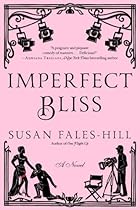 The world we live in is certainly far removed from the world that Jane Austen lived in. So much is different it's hard to know what Miss Austen would think of the way we live now and what she might choose to satirize or highlight about our society and the mores under which we live now. What, for instance, would she think of reality television? And what would she think it says about us as a society that we are so consumed by it? Susan Fales-Hill has taken Pride and Prejudice and reality television and twisted them together to create a different, modern spin on Austen's classic novel of manners in her newest novel Imperfect Bliss.
The world we live in is certainly far removed from the world that Jane Austen lived in. So much is different it's hard to know what Miss Austen would think of the way we live now and what she might choose to satirize or highlight about our society and the mores under which we live now. What, for instance, would she think of reality television? And what would she think it says about us as a society that we are so consumed by it? Susan Fales-Hill has taken Pride and Prejudice and reality television and twisted them together to create a different, modern spin on Austen's classic novel of manners in her newest novel Imperfect Bliss.Bliss (Elizabeth) is a single mother of a disabled toddler who is working towards her PhD and back living with her parents after she discovered her up-and-coming politician husband having an office affair. Her parents are very different from each other, in fact quite mismatched. Mother Forsythia is Jamaican and obsessed with her daughters, all four of whom she named after princesses, marrying up socially. Father Harold is a British ex-pat professor who largely ignores his wife's intentions for their girls. Oldest sister the beautiful and serene Victoria cannot commit to her boyfriend or any boyfriend for that matter, frustrating her mother. Diana, the second youngest daughter, is beautiful, seductively chaste, and coldly calculating about her marital prospects, especially as the new star of the reality tv show "The Virgin" which purports to find her a wealthy husband. Charlotte, only sixteen, is the bad girl of the family, a budding exhibitionist and desperate for the fame and attention that Diana always seems to garner so effortlessly.
Bliss is completely against the concept of the reality show from the beginning and she doesn't appreciate the fact that it will invade every aspect of her family's life. In fact, she refuses to participate or to allow her young daughter, Bella, to be a part of it either, disgusted at the exploitation aspect of the entire thing. That she dislikes the show's very attractive producer, Dario, almost on sight, finding him abrasive, arrogant, and entirely too similar in appearance to her cheating ex-husband, doesn't help her accept the show's presence in her world either. She does, however, have a bit of a soft spot for the host of the show, thinking that she might, in fact, be able to finally move forward in a relationship with him when he evinces an interest in her. As time moves forward, Bliss is forced to take a look at her own prejudices about the people in her life from those in the tv business to her own family and begins to change her feelings once she realizes life is less black and white than shades of grey and to appreciate the nuances all around her. The ending will not come as too great a surprise to anyone familiar with the general plot outline of Pride and Prejudice but there are one or two wrinkles getting there that will keep the reader turning the pages.
Make no mistake in thinking that this is Austen. Fales-Hill takes the basic framework of Pride and Prejudice and builds on it in her own way. It is less preceptive social satire than Austen although her send-up of our scripted-reality obsessed culture is accurate and very tongue in cheek. The characters are ultimately rather different from and definitely more superficial than their corresponding characters in Austen's novel. Like many reality shows today, on many levels the novel is like a train wreck from which you cannot look away. But it's entertaining in its own way, light, frothy, and fun if you're not an Austen purist.
Thanks to the publisher for sending me a copy of the book for review.




Jane Austen and reality T.V.? Interesting. :-) This sounds like a quirky, intriguing novel.
ReplyDelete